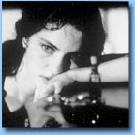|
|
||||
|
by Donald Levit  Styles have changed over sixty-something years, and, besides, New York November is nippier than lovers' Budapest summers. In slacks and beige, button-up collared sweater, and nursing an afternoon cappuccino, Erika Marozsán is no longer cheerfully décolletage Ilona of Gloomy Sunday (Ein Lied von Liebe und Tod). Even so, the pale complexion highlighting blue eyes and framed by brown hair that is lighter than on-screen, draws admiring stares. The famous are commonplace here, and if people wonder who the thirty-two-year-old might be, still it is doubtful anyone places her from "suicide mission . . . action in the Balkans" Sniper 2, a DVD/VHS of last March. Having just finished a radio interview, and shortly to fly off to Vilna to resume winter-scene filming of Ghetto, she is in town for tonight's opening of Germany's Gloomy Sunday. "I'm dancing in the [former] film," playing leading lady Hayyah, a stage actress in the German-Lithuanian-Israeli adaptation of Joshua Sobol's Broadway play about World War II theater. What had intervened to change her course was a director who, Hollywood fable fashion, spotted her among friends on a Budapest street en route to the Academy. She was fifteen and taken aboard for the Romeo-and-Juliet film, The Century Ends on Thursday, a success in her country and a début which got her a national Best Actress Award. Thereafter "I just wanted to escape from the ballet." Though she returned to finish dance studies four years later, she also began to frequent the capital's legitimate theaters and at nineteen matriculated for four years in the prestigious Academy of Theatrical and Film Arts. "Some very good offers [came] from films and theaters, I was fortunate." While living in, and liking, Santa Barbara the last several months -- her boyfriend studies photography there -- she calls Budapest home. From there, international movies, mostly European co-productions, have filled her schedule, though who knows if tonight's already praised release will perhaps bring offers from California. "I'm not thinking about that" while making the film, which, after lengthy runs in New Zealand and Chicago, has received encouraging advance response from critics on both U.S. coasts. Her somewhat accented English is fine, though she might be hesitant to test out that school French. One's first language is no great matter, anyhow, with the single camera's short takes of less than thirty seconds at a time. There are, after all, mental exercises, she offers, to help an actor keep going and maintain emotional pitch. On the stage live for three, four, sometimes five hours, one has necessary time to prepare, but what she calls the brief "pieces" of cinema cannot truly be rehearsed. With a hundred people gathered around--except for closed sets like Gloomy Sunday's bathtub scene, involving only the two actors, cameraman and his assistant -- and though "people say it's absurd, that's not true, every human being has imagination, [which] helps you know where you have to be at a certain moment in the shooting." Ms. Marozsán did attend the 2001 Oscar ceremonies, when her short film One Day Crossing was in the running. But her goal is not awards or glossy rôles. The reward is in the work itself, arduous and demanding, sometimes dependent on contacts: recommended by a Hungarian producer, she first met Ghetto director Andrius Juzenas in a café, but ahead were innumerable "castings [auditions], to make sure it was right, months long because this is an important film." Poised she is, film and stage actress, former ballet student, sometime singer, perhaps to take off and soar. Lerner and Loewe's "ruder pest from Budapest" may be more familiar. But that is for the moment. One expects that the future will bring more good things from this young actress. |
||
|
© 2026 - ReelTalk Movie Reviews Website designed by Dot Pitch Studios, LLC |



